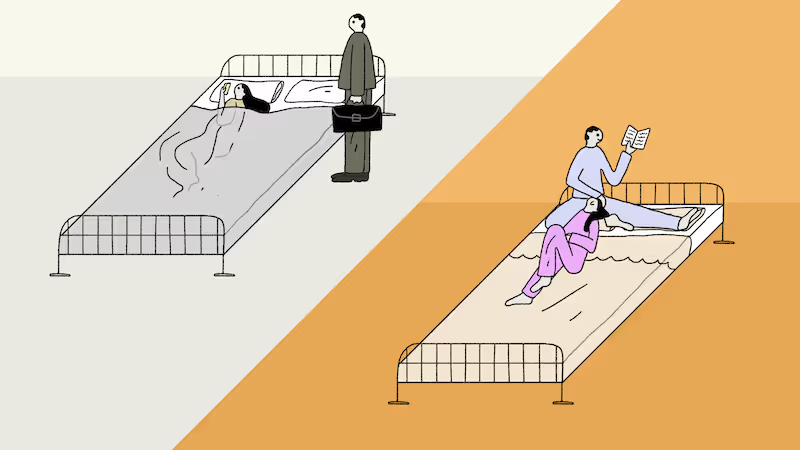Shall We Begin?
WE CAN GO A LONG TIME WITHOUT HAVING SEX.
Plenty of people live without sex entirely, whether they are asexual, celibate by choice, grappling with trauma or physical pain, or for many other reasons. Some people prefer to have sex alone or to engage with their erotic self in other ways—through imagination, art, erotic novels, or films. There are so many ways to connect with your erotic self. Sex is just one avenue.
That said, when people come to me to talk about sexlessness, it’s typically because they really want to be having sex. They don’t understand how they fell out of practice or how the chasm between their partner’s desire and theirs grew so large, so seemingly uncrossable. They often tell me they want more sex. They always tell me they want better sex.
WHEN YOU WANT TO WANT . . .
Sex goes on the back burner when we’re not in the mood, have kids around, are exhausted by work, caregiving, or both. You may want to have sex, but it simply isn’t a priority. And the more time that passes, the harder it can be to initiate, let alone address in conversation.
That silence is the perfect habitat for anxiety to grow. The confusing and/or harmful cultural, familial, and societal messaging you may have received about sex while growing up thrives in this space. Many of us are told to hide our sexual selves and our desires. A dry spell can feel like confirmation that we should. When you want it but aren’t having it—or when you want to want it and just don’t—shame will convince you: It’s an individual problem. It’s your fault.
I'm here to tell you: It’s not.
YOU ARE NOT ALONE.
I am headed to Los Angeles, San Francisco, and Seattle this week to pick up the west coast leg of my tour, An Evening with Esther Perel (learn more).
There is an exercise I do during the show that demonstrates how not alone you are. I ask the audience to raise their phone flashlights if, growing up, sexuality was central at home. Very few people turn their lights on. Those who do, I’m told, turn their light on because they received adequate sex ed from their parents or observed their public displays of affection.
I then ask the same question in a different way: “Turn your flashlight on if sexuality in your family was hidden or hinted at.” Many more lights come on and I tell them to keep them on.
Then I say, “Turn your light on if sexuality was violated, misused, or abused.”
And finally, “Turn your light on if there was infidelity.”
Slowly at first and then all at once, we find ourselves in a sea of lights, each one representing what we all usually carry alone in our internal darkness. Sexuality is always more central than we acknowledge, and the messaging we learned about sex growing up tends to show up in our sex lives later on. No wonder sex—and a lack of it—can be so hard to talk about.
RECONNECT TO DESIRE
Inside of your sexual preferences lie your deepest emotional needs. That’s a lot to process by yourself and can be even harder to do with a partner. But I believe if you want to have fulfilling, pleasurable, and satisfying sex, the work of understanding yourself, your desires, and what you bring to the experience is essential.
It’s clear to me that a live in-person show, however visceral, is only available to very few. With that in mind, I’m so pleased to be able to offer something brand new that I can bring to you, wherever you are in the world and on your sexual journey.
That’s why I am launching my new Desire Bundle—two courses that will help you overcome the shame and misconceptions that often block sexual satisfaction and bring more vitality and aliveness into your relationship.
Click here to join the waitlist.
Let’s Turn the Lens on You
A sexual rut can show up in many ways. Which one resonates for you?
- You haven’t had sex in a long time.
- Sex has become the elephant in the room that you avoid.
- You’ve talked about sex many times, but nothing changes.
- You don’t feel desirable.
- Whenever you think about sex, it conjures painful memories and negative associations.
- You have little-to-no sexual interest in your partner, or you feel rejected by them.
- You’re caught in the dance of distancer and pursuer, where one of you is always seeking sex and the other is always shutting it down.
- You wonder, “Why even try?” because your attempts to reconnect erotically have failed.
Take a few moments now to reflect on these scenarios. Know that they are both common and impermanent. In my two new courses, you’ll discover how to navigate these sexual dilemmas and reignite desire in your erotic life. Read on to learn more and join the waitlist.
More from Esther
OPENING SOON! THE DESIRE BUNDLE | join the waitlist
Inside my Desire Bundle, you’ll find two courses: Bringing Desire Back and Playing with Desire. The first will help you remove sexual blocks and reignite desire. The second will help you tap into new erotic possibilities and play your way to an erotically charged life.
If you feel stuck in a sexless relationship, frustrated by a lack of desire, or excited by the idea of new erotic possibilities, I invite you to join the waitlist today.
When you do, you’ll receive early access to enroll in the courses on September 17, plus:
- Access to the best pricing
- A chance to ask me your questions about desire and eroticism
- The opportunity to attend a live virtual workshop and Q&A with me when you purchase the courses
- The opportunity to join a special foreplay challenge when you purchase the courses
Plus, you’ll receive more insights into desire and eroticism from me over the coming weeks.
Join the waitlist to learn more.
Conversation Starters
A COMPENDIUM OF HIGHLY RECOMMENDED SOURCES OF INSPIRATION AND INFORMATION
I’M REMEMBERING:
Helen Fisher was a force of nature—her work on the brain circuitry of love was both scientifically rigorous and poetically profound.
When I was getting ready to publish my first book, Mating in Captivity, I faced resistance over the title. I knew it was the right name—that it captured the essence of the book—so I called Helen to discuss it. But she had no time for discussion. Her response was immediate and fierce: “You must fight for your title. This is your book.”
She gave me the confidence I lacked. Emboldened by her rallying cry, I stood my ground and got my title. Helen boosted me and I’ve never forgotten that moment. Over the years, our paths crossed many times. She was not just a colleague but a guiding light, someone who validated my clinical observations with her empirical research.
Her book, The Anatomy of Love, remains a must-read, and the conversations we had, including the one we had on stage at TED, “Technology hasn’t changed love. Here’s why,” are moments I will always cherish.
Helen, your wisdom, grit, and vitality will continue to inspire me, and so many others, long after your passing. What you did for me I have now done for a few other authors—and each time, I tell them our story. Rest in peace, dear friend.







.svg)





